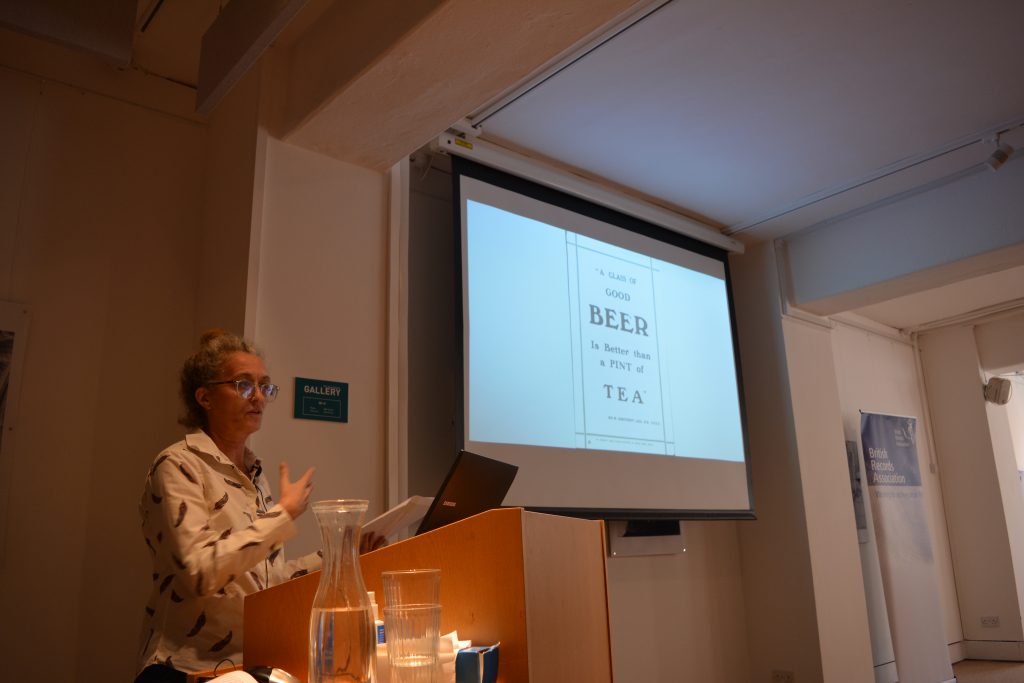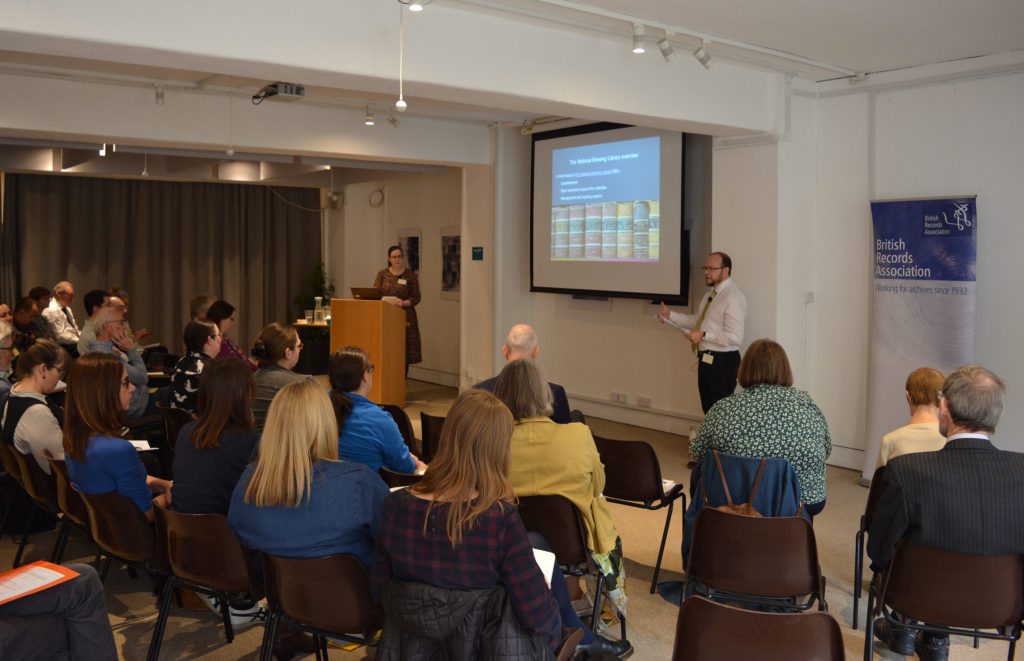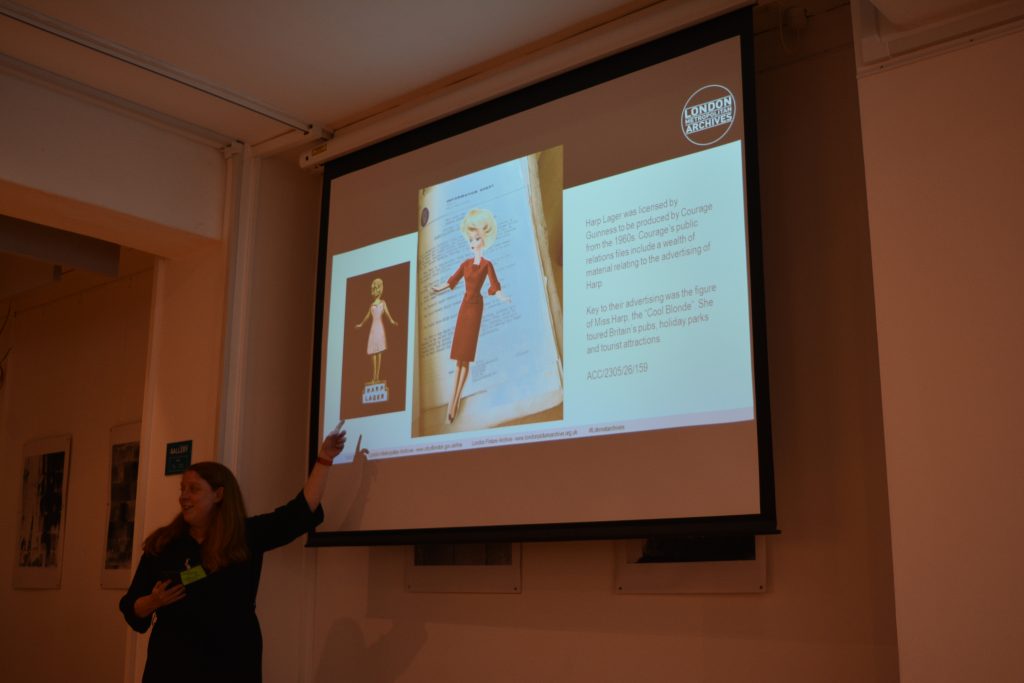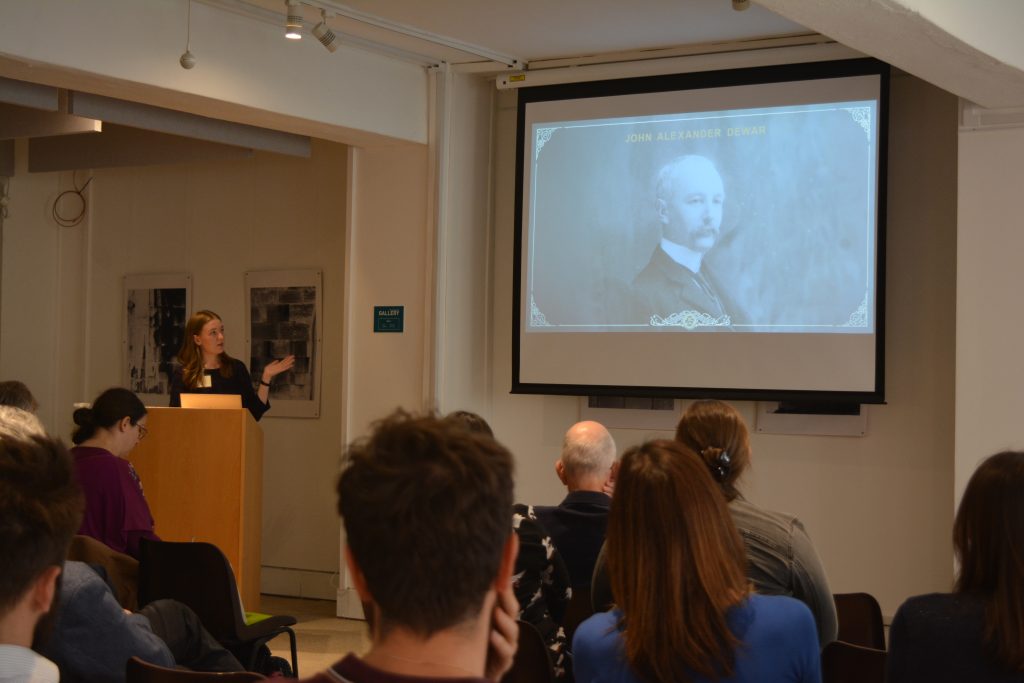Distilling the Archives – A review
Review by Matthew Abel
I was privileged to be awarded the free place at this year’s British Records Association (BRA) conference, Distilling the Archives: The Records of the Drinks Industry in the UK, held in London on 5 October. I am not a BRA member and this was my first time attending a BRA event, but the theme appealed to me as I am writing a history of the former Ind Coope brewery in Romford, East London – the town where I grew up and where I had my first experience of heritage work in the local museum which now occupies part of the old brewery site. I hoped that the conference would help me identify potential new archive sources to explore and give me an opportunity to network with other researchers interested in brewing history, and the day certainly delivered on both counts.
TNA and Warwick Modern Records Centre

Rachel MacGregor, Archives Manager at the Modern Records Centre (MRC), University of Warwick points to a slide that says ‘A glass of good beer is better than a pint of tea’. Photograph by Amanda Engineer, BRA Secretary.
Following a welcome from BRA Chair Matti Watton, the morning session began with Keith Mitchell, Volunteer Projects Officer at The National Archives (TNA) and Rachel MacGregor, Archives Manager at the Modern Records Centre (MRC), University of Warwick, each highlighting areas of interest in their respective collections for researchers of the drinks industry. Reminding us that it’s “not just about taxation”, Keith demonstrated how the long history of wine consumption and retailing in Britain can be traced in a wide range of TNA’s records, such as Stationers Office files, import registers and even the newly-digitised Prize Papers of the High Court of Admiralty. As the principal repository for the archives of trade unions, employers’ associations and pressure groups, the MRC is an important resource for researchers of all branches of industry, and Rachel introduced us to their primary holdings relating to brewing and the pub trade. We were treated to some gems from the collections of the British Beer and Pub Association and the National Trade Defence Association as well as the newly-acquired Campaign for Real Ale (CAMRA) archive, which continues to accrue. Rachel’s invitation to researchers to get in touch with the MRC to help inform its future digitisation priorities will, I’m sure, be enthusiastically taken up!
The National Brewing Library at Oxford Brookes, and Brewing, Pubs and the Arts

Dr Robert Curry and Annabel Valentine of Oxford Brookes University presenting on the National Brewing Library. Photograph by Amanda Engineer, BRA Secretary.
‘New perspectives’ was the theme of the next half of the session. Dr Robert Curry and Annabel Valentine of Oxford Brookes University reflected on how they used the recent 20th anniversary of the National Brewing Library (NBL) to focus on telling more diverse stories with its collections, which has helped to revive visitor and enquiry numbers since the Covid lockdowns. Women in brewing was a key theme of the NBL’s anniversary programming and it was interesting to hear how female craft brewers today are reclaiming the historic term ‘brewster’ from their medieval counterparts. Dr Emma West of Birmingham University then spoke about a little-known but fascinating intersection between brewing and the arts by exploring the artistic patronage of Britain’s leading brewing companies in the 1920s-60s. Emma revealed how the likes of Whitbread, Ind Coope and Mitchell and Butlers organised classical music concerts, plays and poetry readings in their pubs as well as commissioning original art from leading names of the day such as John Piper. Ostensibly designed to open up the arts to a wider audience, these innovations trod a fine line between democratisation and gentrification, and Emma noted that the reactions of the pubgoers who were exposed to them are not often captured in the archives.
Promoting Distilleries in Scotland
After lunch, it was whisky galore with two fascinating case studies on Scottish distilleries from Samantha Case, Archivist at Dewar’s (Bacardi), and Joanne McKerchar, Senior Archivist at Diageo. Samantha explained how mounting a 125th anniversary exhibition at Dewars’ Aberfeldy distillery presented a challenge, since the archive comprises mostly modern records. This compelled the archive team to think creatively about the stories they could tell and to seek out alternative sources like the British Newspaper Archive to supplement their research. Joanne revealed how Diageo’s archive proved fundamental to their project to reopen the mothballed Brora distillery in 2021, allowing them to faithfully re-establish production and reach out to former employees with vital specialist knowledge. It was evident from both presentations how much Bacardi and Diageo value their archives, not just as tools to support business-as-usual activity but also as a means of celebrating the heritage of their constituent brands. This attitude is extremely heartening, as many of us will be all too aware of other business archives that have been lost, or are currently under threat,. variously due to corporate oversight, lack of resource or interest, and under-appreciation of the value of historic records.
It’s All in the Brewing!

Catalogue Editor Claire Titley gave us a broad survey of breweries from London Metropolitan Archives. Photograph by Amanda Engineer, BRA Secretary.
The afternoon rounded off with a focus on brewing company archives. The London Metropolitan Archives (LMA) holds the records of more brewing companies than any other local record office (150+) and Catalogue Editor Claire Titley gave us a broad survey of their rich and varied content. Acknowledging that they are an underused part of LMA’s collection, Claire demonstrated how the brewing archives can be a treasure trove for genealogists, provide a valuable record of lost London buildings and street life, and offer insights into social issues such as pub violence, racial segregation and sexism in advertising. Speaking to Claire beforehand, I was also delighted to learn that she manages the LMA’s long-running project to index the policy registers of the Sun Fire Office, which have been a vital source for my own brewery research. Finally, we moved from brewing companies to The Brewers’ Company, as Archivist Hannah Dunmow initiated us into ‘the Mystery or Art of Brewers of the City of London’, tracing the livery company’s history and functions from its medieval origins to the present day. Hannah’s talk dovetailed well with Claire’s as most of the Company’s archive is cared for by the LMA and stored at Guildhall Library – a long-running arrangement which thankfully saved it from destruction when Brewers’ Hall was destroyed during the Blitz. It was interesting to hear that the Brewers’ Company archive contains one of the earliest references to football in the English language, from 1422 – sure proof that beer and football have always belonged together!
Final Thoughts
The end-of-day panel discussion covered concerns over digital collecting and preservation, with some speakers acknowledging that they collect little or no born-digital content and others highlighting skills gaps which prevent them knowing how best to preserve and make use of such material. In today’s work environment where so much discussion and decision-making happens via email, video calls and group chats, the panellists agreed that more needs to be done to raise awareness among employers of the importance of preserving born-digital files to avoid leaving future generations an archival black hole for our own time period. The increasingly complex ownership structures of modern businesses were acknowledged as another complicating factor in acquiring new archives, as companies can be frequently absorbed into and traded between larger corporations, and research is usually outsourced to external agencies. On the specific theme of the day, there was a consensus that those managing drinks industry archives should make more effort to collect material which documents the negative effects of the industry on public health and the environment, as well as material relating to charities and pressure groups combating issues like alcoholism.
This was a varied and extremely interesting programme and the speakers all brought a great deal of expertise and enthusiasm to their individual topics. I was particularly struck by the friendly and collaborative atmosphere in the room, which others also commented on, and which is sadly absent from some other conferences! It was marvellous to see academics, archive professionals, volunteers and amateur researchers (like me) exchanging knowledge on an equal footing, forging new connections and identifying opportunities for future collaborations. Cheers!

